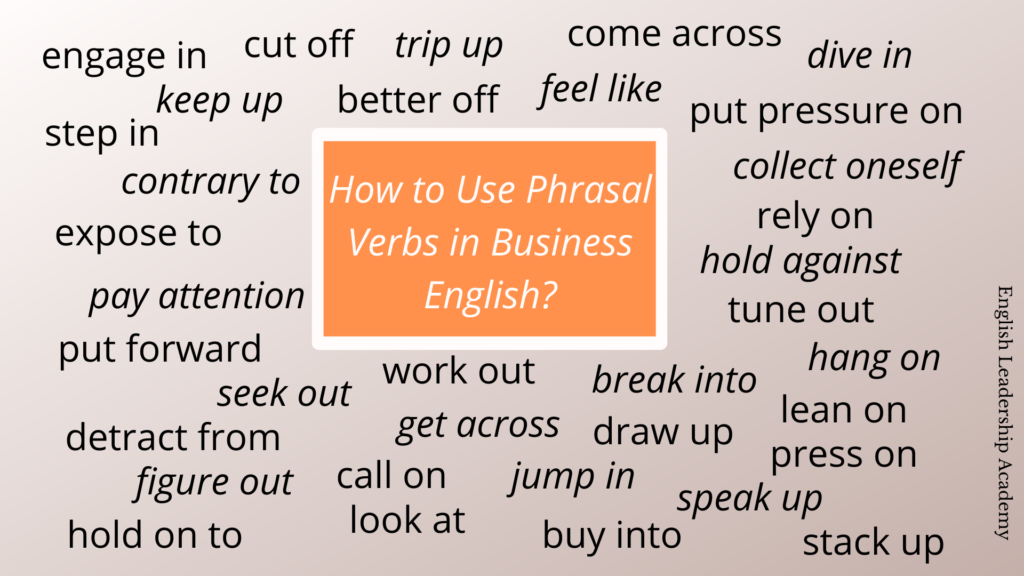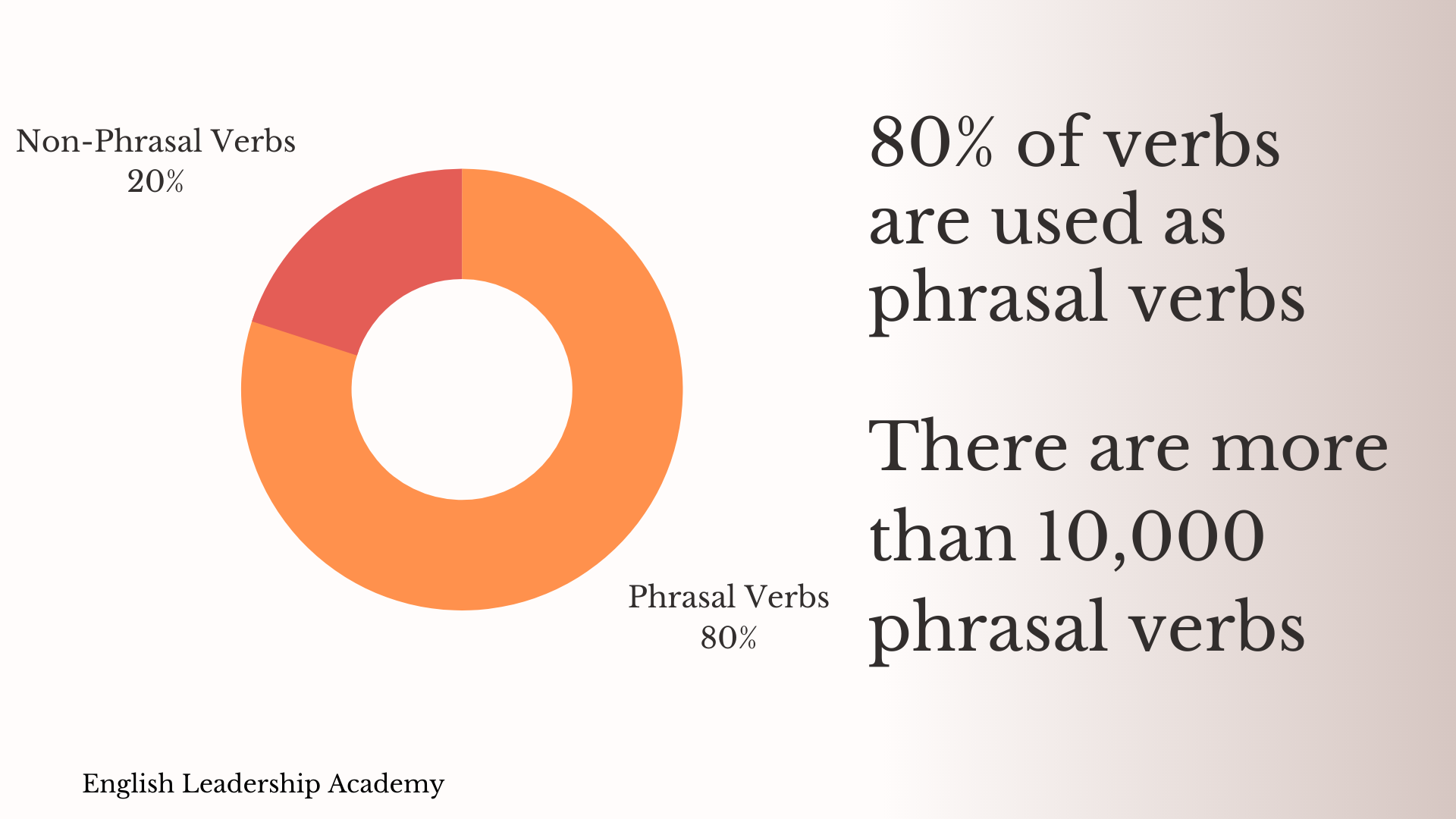How to Use Phrasal Verbs in Business English
Phrasal verbs can be one of the most challenging aspects of the English language.
The first question is: who came up with this crazy term of "phrasal verbs"??
Why don't the academic English elite use simple, understandable words to define things like.....
phrasal verbs....what's phrasal?
idioms...really?? why did they choose this word??......and finally...
collocations... No comment
I wonder how we can work together to change the names of these silly words they chose?? Any ideas??
Ok...back to phrasal verbs...
The biggest reason that you need to understand phrasal verbs is that there are more than 10,000 phrasal verbs in the English language.
Many of these are used very commonly by all native speakers.
If you'd really like to understand what a native speaker is saying, you really do need to start becoming more aware of what phrasal verbs are.
Now that you understand that phrasal verbs are VERY common let's dive a little deeper.
This article will attempt to accomplish three things:
- Define what phrasal verbs are
- Explain why you need phrasal verbs
- Discuss how phrasal verbs are used
Let's take a look at what they are. First, here are 35 very commonly used business English phrasal verbs.
What is a phrasal verb?
The first thing to think about is that there is always a verb in a phrasal verb.
There is always some action that you are describing.
Because there is always a verb, the verb tense can describe something that happened in the PAST, or something that is happening in the PRESENT, or something that will happen in the FUTURE.
And a phrasal verb is a combination of the verb with some other words - it is typically one or two additional words.
The big issue is that phrasal very DO NOT translate most of the time to your native language.
They use another crazy word to described phrasal verbs - they call them idiomatic (yes, I know...another overly difficult crazy word for no reason)... Idiomatic means they do not normally translate to your native language.
As stated earlier, phrasal verbs are so common in the English language.
Yes, you want to learn how to use them, but the first step is listening for them.
As you improve your English communication skills, becoming aware of people using phrasal verbs is an important first step. You want to able to clearly understand what people are saying.
One of my other articles in the English Leadership Academy's Executive Business English Blog discusses in detail how important listening is for fluency.
If you haven't read that article yet, you can find it here: Listening is the Key to Fluency.
I've put together a video to summarize everything discussed above.
Take a look. I think you'll find it quite helpful, as it provides additional information and detail on what phrasal verbs are, why you need them, and how they are used so naturally by native speakers.
Now that we understand of what a phrasal verb is, we can move forward and see why you need them.
Why Do You Need Phrasal Verbs?
With more than 10,000 phrasal verbs being used every day by native speakers, phrasal verbs are obviously important.
Because phrasal verbs are so common, they are used very naturally by native speakers. They are not used naturally by most non-native speakers.
It will be one of your goals as you begin to increase your English communication confidence to make phrasal verbs become part of your natural vocabulary.
Later in this article, I'll discuss how you can become part of your vocabulary and how you can naturally use them.
Also, phrasal verbs can really be a benefit because they are both descriptive and accurate.
Every new client I work with explains that they want to be more descriptive and accurate in their choice of words.
They don't initially understand how important it is to naturally use phrasal verbs to achieve this goal.
As you can see, phrasal verbs are very common and a natural part of the English language.
Phrasal verbs are an essential aspect of the language to communicate effectively. As you saw earlier in this article, there are SO many phrasal verbs.
Here's a short video explaining why phrasal verbs are essential for becoming confident in communicating confidently in business English.
You might be asking yourself, how can you start becoming comfortable with phrasal verbs?
Let's look at some ways to start using phrasal verbs.
How to Use Phrasal Verbs
As I discussed earlier in this article, an important detail about making phrasal verbs part of your vocabulary is listening for them or seeing them in some interesting material you are reading.
If you are not familiar with how to find good material to listen to, you should check out this short video on finding interesting material.
The best place to find phrasal verbs is within a business article you are reading, a business podcast you are listening to, or maybe a business-related video you are watching.
As the video above discusses, it is essential to have professional transcripts to use if you are using a podcast or a video.
Using professional and interesting material is not only is the best thing to do, but it is also so much easier when you are trying to use phrasal verbs naturally.
Step 1. Become aware of the phrasal verbs
Step 2. Understand the meaning of the phrasal verb
Step 3. Practice using phrasal verbs in sentences out loud.
Step 4: Create your own thoughts and sentences using the phrasal verbs out loud.
You have followed the examples in the video above about finding interesting material and becoming aware of business phrasal verbs. Now, what do you do?
You need to find a good dictionary resource to help you understand how to use the phrasal verb.
You need more than just a normal dictionary.
And using translation software or an app really is NOT helpful to you.
I highly recommend you use Cambridge Dictionary to help you with your journey of having phrasal verbs become natural for you.
I recommend the Cambridge Dictionary for two primary reasons:
- Many example sentences are given
- The business English section is a great best resource
To really understand the meaning of a phrasal verb, it must be studied in the context of a full sentence.
Memorization is not the answer to using phrasal verbs.
Using the phrasal verbs in sentences is the answer.
And the Cambridge Dictionary has a Business English version.
This is critically important to find the phrasal verbs being used in a business context.
If only the Cambridge Dictionary plus could find a way to create an app, it would be a beautiful solution, but now, you are stuck with the web-only version.
After you have discovered the phrasal verb and researched what it means, you have two mandatory steps remaining:
Create your own thoughts and sentences with the phrasal verb
and...
Say your thoughts and sentences out loud and get used to saying the words.
Here's a 4-minute video clip explaining how to learn phrasal verbs and then start using phrasal verbs.
I highly recommend you watch this video as there is a great technique for practicing using phrasal verbs that will have you start naturally using them in the future.
There are some specific techniques discussed above in this article, and if you follow them, you will find great success making phrasal verbs part of your natural business vocabulary.
Of course, there are many challenges with phrasal verbs.
Let's take a look at some of them.
Challenges of Learning Phrasal Verbs
With more than 10,000 phrasal verbs being used, of course, there are many challenges. Here are some.
- Phrasal verbs have multiple meanings
- Many times phrasal verbs do not translate
- Different phrasal verbs can look very similar
Here's a 2-minute video discussing the main challenges you will experience while trying to become comfortable with phrasal verbs.
Your Next Steps With Phrasal Verbs
Phrasal verbs can become part of your natural vocabulary if you take the right approach to them.
This article has described what phrasal verbs are, why they are important to you, and how you can start using them.
A few final thoughts that you should consider:
Genuinely listen for phrasal verbs
Be very curious about phrasal verbs
Be patient with phrasal verbs
Have fun with phrasal verbs
As always, if you have any questions, please do not hesitate to ask, and I will be pleased to answer your questions.




